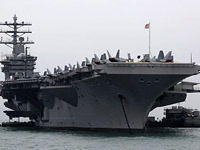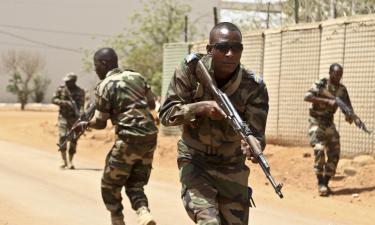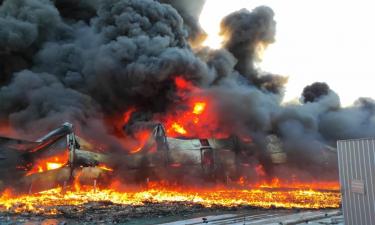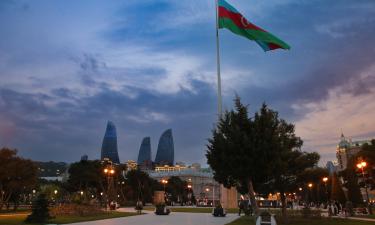Nazi issue in Baltics: EU needs to take a stand
In late July-early August, the Baltic countries and Ukraine demonstrated suspicious loyalty to Nazism. On July 31, despite a torrential rain, veterans of the 20th Estonian SS Division gathered in the town of Sinimäe for a regular meeting. Prime Minister Andrus Ansip rushed to reassure the public, explaining that participants of the rally will commemorate all soldiers who died during World War II.
July-early August, the Baltic countries and Ukraine demonstrated suspicious loyalty to Nazism. On July 31, despite a torrential rain, veterans of the 20th Estonian SS Division gathered in the town of Sinimäe for a regular meeting. Prime Minister Andrus Ansip rushed to reassure the public, explaining that participants of the rally will commemorate all soldiers who died during World War II.
Gatherings of SS veterans dedicated to certain "historic" dates are regularly held in Latvia, Lithuania and Estonia, with the tacit approval of the authorities.
In early July, the Jewish community has condemned the planned action in Viljandi (South Estonia), dedicated to the 70th anniversary of the entry of German troops into the city. Jewish News Agency quoted Alla Jakobson who spoke on behalf of the community:
"The estimates of the difficult events in the history of Estonia's mid-twentieth century may be different. But it would be cynical to speculate on which of the two occupying regimes "was better." "Particularly, given the fact that the regime of Nazi Germany was declared criminal by the international tribunal."
This statement does not allow suspecting Alla Jakobson in excessive sympathy for the Soviet Union. The statement reflected the cautious attitude of the Jewish community of Estonia to the opposition of anti-fascists and neo-Nazis. However, Alia Jacobson made it clear for the Estonian authorities that the Jews will not put up with the meeting of the SS, even relatively small.
In early July, anti-fascist organizations in Latvia and Estonia decided to hold their own events on the day of remembrance of the victims of the concentration camp system Vayvarskoy in protests against frequent gatherings of the supporters of the fascist ideology.
To ease the tension around the issue of neo-Nazism, Estonian Prime Minister Andrus Ansip went to Washington, where he met with the members of Jewish organizations and for a long time was telling them that there was no anti-Semitism in his country. "In Estonia, there has never been anti-Semitism at the state level. To the Estonian people, seriously affected by various totalitarian regimes, anti-Semitism and racism are completely alien," information portal IzRus quoted the Estonian premier. However, the reaction to the visit of the Jews and Russians living in Estonia was largely negative. Sympathies of the official Tallinn towards SS veterans has long been obvious to everyone.
In July of 2011, only former SS legionnaires and their supporters were granted permission from authorities to hold rallies, while anti-fascists were denied similar requests. On July 31 in the town of Sinimäe, where 67 years ago fierce battles between the Soviet army and German troops took place, several hundred veterans of the SS division gathered. The "gathering" was attended by young supporters of the nationalist movement, as well as some representatives of the local authorities.
As reported by the international human rights movement, "A world without Nazism", especially distinguished member of the parliament from the party "Fatherland Union and the Republic" Trivimi Velliste was among the speakers. He said that his fellow party member, Minister of Defense of Estonia, Mart Laar promised to proclaim the veterans of the 20th SS Division "freedom fighters". At the same time a meeting of anti-fascists was held by the Estonian movement "Night Watch" together with the international human rights organization "World without Nazism." They laid wreaths and flowers at the monument to the Soviet soldiers fallen under Sinimäe.
Many news agencies, one way or another connected with the activities of the Jewish communities in Russia and the Baltic countries, had a strong reaction to the July meeting of the Estonian SS. New materials on the issue of neo-Nazism in Estonia, Latvia and Lithuania appeared in numerous forums and blogs. Several media publications have reprinted an excerpt from a famous blogger and journalist Gennady Granberg, devoted to the SS atrocities in Estonia, who, according to modern nationalists, "liberated" the country from the Soviet occupation. The Estonian journalist quotes an excerpt from the newspaper "Sakala" of 2006, which described the horrific killings of Jews in Viljandi:
"Vilyandinskaya Municipality issued the following order on July 31, 1941: "Jews must wear the yellow Star of David, 5 cm in size, on the right side of their chest." The supervision was entrusted to the police and police aides. Jews were forbidden to use public transport, walk on sidewalks, appear in public places and much more. Immediately after the arrival of the Germans a squad of police and defense was assembled, and all Jews were arrested. They were placed in a police building in the lockup, in prison. The rooms were crowded with people.
Soon the men were shot. One night all the women and children, including infants, were ordered to go into the prison yard, where a truck was waiting for them. The prisoners were ordered to remove their clothing and footwear, and give away jewelry. Wearing only underwear, they were put into a truck. Sensing the trouble, the prisoners began to shout for help. The "train of death" set off on its last journey. A mass grave was ready. "
However, even the numerous publications of documents conclusively proving the crimes of the SS in the Baltic cannot stop the endless demagoguery of the Estonian nationalists who are looking for any excuse to justify fascism. Regular SS marches may look like an innocent prank that is not contrary to the democratic laws on freedom of speech and assembly. However, such actions seriously disturb the public and strengthen the position of the ultra-right.
Not that long ago, the media has leaked information that the Lithuanian government secretly financed radical groups. In addition, the number of neo-Nazis in the Lithuanian army is growing. Army photos show young men with tattooed swastikas on their bodies. Fascist symbolism can be found on their custom-made clothes. This information is provided by Regnum news agency referring to the anti-fascist website antifa.lt that posted scandalous photos.
In Ukraine in the last decade the glorification of former soldiers and officers of the Ukrainian Insurgent Army (UPA) has been ongoing. Recently, Yuri Shukhevych tried to reverse the ruling of the Supreme Administrative Court of Ukraine that stripped his father, Roman Shukhevych, the leader of the Nazi henchmen who murdered Jews and Poles in Lviv in June of 1941, of the title of Hero of Ukraine. The court refused to reverse its decision. Now, Yuri Shukhevych intends to appeal the court ruling in Strasbourg. "Shukhevych is one of the most iconic figures of the UPA, and no doubt, he is a hero," said on August 3 MP Oles Dony.
In the 21st century fascism among young people is becoming trendy. Unfortunately, these trends have not spared Russia, but the authorities intend to fight vigorously against all forms of extremism and nationalism, which was demonstrated, in particular, in the events at the Manege Square. Russian Foreign Ministry strongly condemns the actions of neo-Nazis Baltic, insisting that the EU makes more clear laws prohibiting such activities. The U.S. and Israel also have questions for the governments of the Baltic countries about nearly official glorification of fascism. But the EU seems in no hurry to restore justice in the Baltic States, preferring to engage in politically "relevant" issues of justice, including the case of Serbian General Mladic. Estonian neo-Nazis are no longer "relevant".
Yuri Sosinsky-Semikhat
Subscribe to Pravda.Ru Telegram channel, Facebook, RSS!





